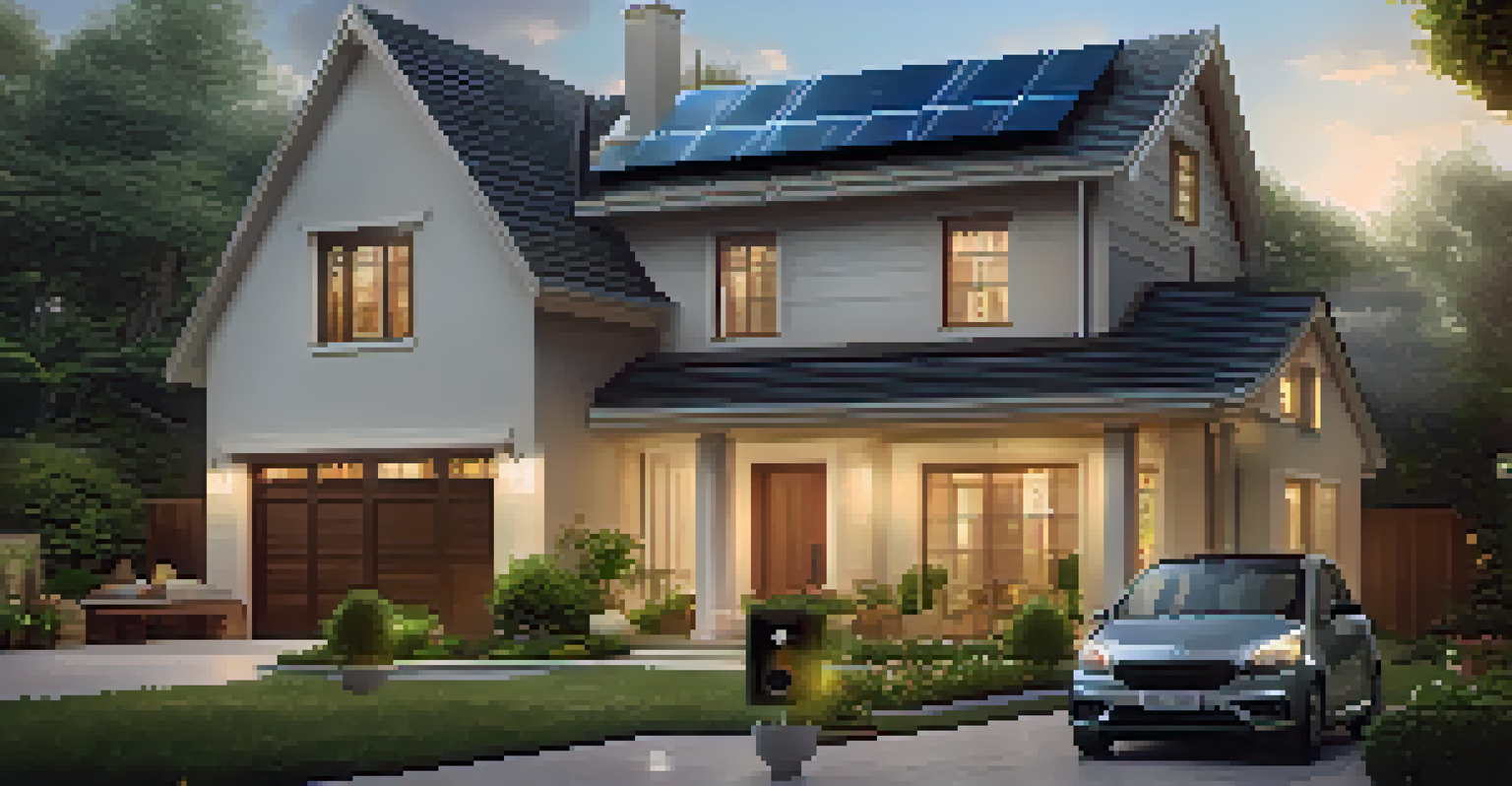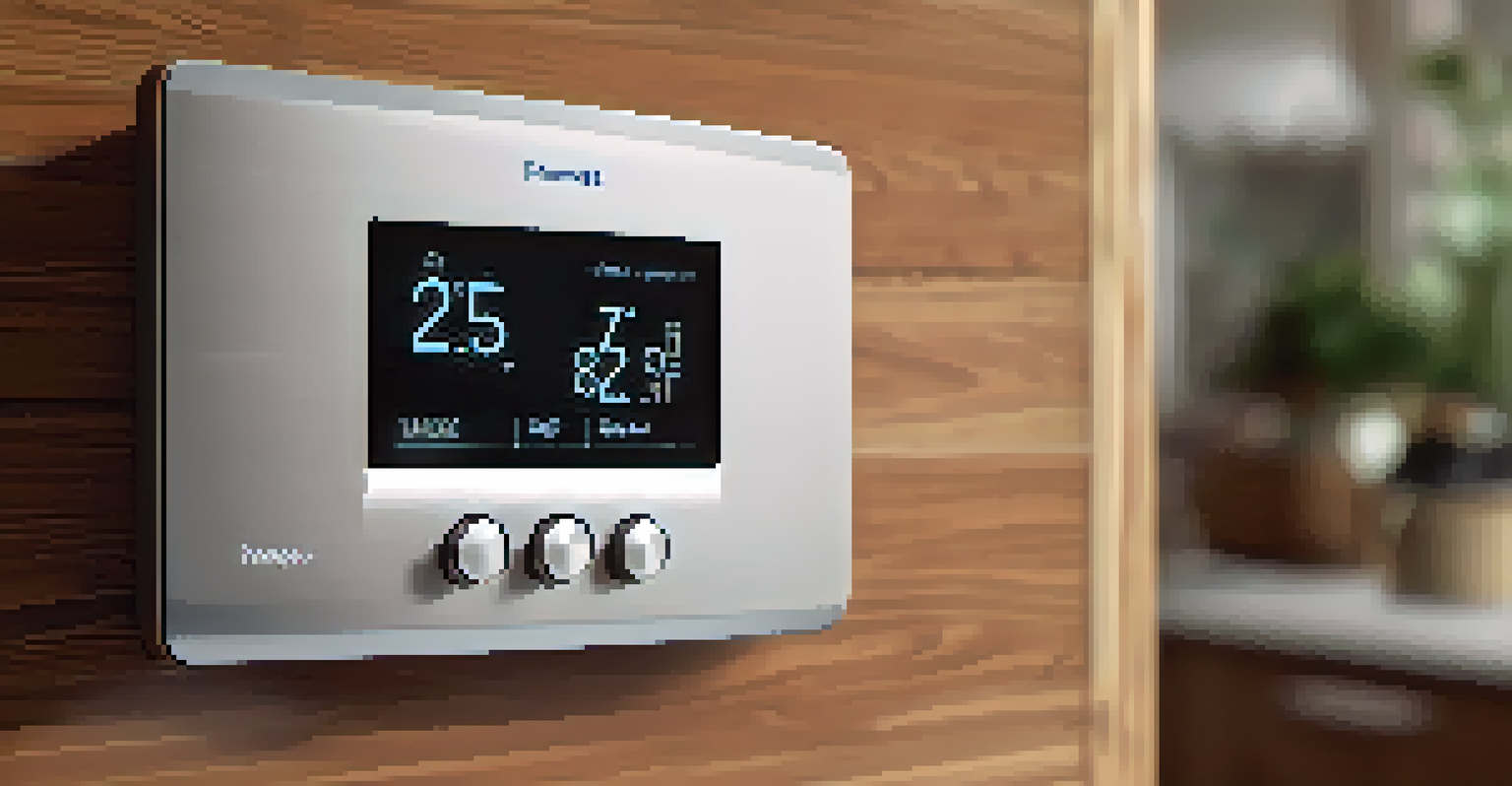The Impact of Smart Home Technology on Home Value

Understanding Smart Home Technology and Its Benefits
Smart home technology refers to devices and systems that automate and enhance household functions. From smart thermostats to security cameras, these innovations allow homeowners to control various aspects of their homes remotely. The main benefit? Increased convenience and energy efficiency, helping you save time and money.
The future is already here – it's just not very evenly distributed.
Imagine adjusting your thermostat from your phone while you're at work, ensuring your home is comfortable when you arrive. This level of control also extends to security systems, where you can monitor your home in real-time. As consumers become more tech-savvy, the appeal of these features increases, making smart homes a hot commodity.
Furthermore, smart home technology often leads to lower utility bills, which is an attractive selling point for potential buyers. Homes equipped with these features can offer a modern lifestyle that aligns with the values of today's market, emphasizing sustainability and efficiency.
How Smart Home Features Increase Market Appeal
When it comes to selling a home, first impressions matter. Smart home features can significantly enhance your property's appeal, making it stand out in a crowded market. Buyers are increasingly looking for homes that offer the latest technology, and a smart home can be a key differentiator.

For example, a home with a smart security system not only provides peace of mind for buyers but also demonstrates the owner's commitment to safety. Similarly, smart lighting and energy management systems can show prospective buyers that the home is both modern and cost-effective.
Smart Homes Boost Market Appeal
Integrating smart home features can significantly enhance a property's attractiveness, making it stand out to potential buyers.
Ultimately, showcasing these smart features can entice buyers who are willing to pay a premium for modern conveniences. A home equipped with the latest smart technologies often feels more move-in ready, which can lead to quicker sales and potentially higher offers.
The Role of Energy Efficiency in Home Value
Energy efficiency is a hot topic in the real estate market, and smart home technology plays a big role in this trend. Devices like smart thermostats and energy-efficient appliances can significantly lower energy consumption, which is appealing to both eco-conscious buyers and those looking to save on utility costs.
Technology is best when it brings people together.
For instance, a smart thermostat can learn your schedule and adjust temperatures accordingly, saving energy when you're not home. This not only reduces your carbon footprint but can also lead to substantial savings on energy bills, a fact that resonates well with buyers.
As more individuals prioritize sustainability in their purchasing decisions, homes that promote energy efficiency through smart technology will likely see an increase in value. An eco-friendly home can command a higher price, making energy-efficient upgrades a wise investment.
Smart Home Technology and Safety Features
Safety is a top priority for many homebuyers, and smart technology can enhance security in numerous ways. From smart locks to surveillance cameras, these features can provide homeowners with the peace of mind that traditional systems may not offer. Buyers are naturally drawn to properties that prioritize their safety.
For example, imagine receiving a notification on your phone when someone approaches your front door, allowing you to monitor visitors in real-time. This level of security not only deters potential intruders but also reassures buyers that their future home will be safe.
Energy Efficiency Increases Value
Smart home technology promotes energy efficiency, appealing to eco-conscious buyers and potentially increasing the home's market value.
With the growing concern over home security, smart features can be a significant selling point. Homes equipped with these technologies often command higher prices, as they provide an added layer of safety that many buyers are willing to invest in.
The Importance of Integration with Existing Systems
When considering the value of smart home technology, integration is key. Buyers appreciate systems that work seamlessly together, allowing them to control various aspects of their home from a single app. This ease of use can make a property more attractive and enhance its market value.
For example, a smart home ecosystem that connects lighting, security, and climate control can create a cohesive living experience. Buyers may be willing to pay more for a home that offers this level of convenience and sophistication.
Moreover, as technology continues to evolve, homes that can easily integrate with new devices will remain relevant in the market. This adaptability can lead to a sustained increase in property value as homeowners invest in further upgrades over time.
Investment and Return on Smart Home Upgrades
Investing in smart home technology can yield significant returns when it comes time to sell. Many homeowners are surprised to find that the upgrades they initially viewed as luxuries can actually enhance their home's value. This means that spending on smart devices can be a savvy financial move.
For instance, installing a smart sprinkler system can save water and reduce bills, making the home more attractive to buyers who value efficiency. Additionally, features like smart lighting and advanced security systems can be selling points that justify a higher asking price.
Safety Features Attract Homebuyers
Advanced security options provided by smart technology can enhance buyer confidence and drive up property prices.
Ultimately, the key is to strategically choose upgrades that have proven to increase home value. An informed investment in smart technology not only enhances your living experience but can also pay off when it’s time to sell.
Future Trends in Smart Home Technology and Real Estate
The landscape of smart home technology is constantly evolving, and it's essential for homeowners and buyers to stay informed about emerging trends. As new devices and features become available, they can greatly influence home values and buyer preferences. Keeping up with these trends can help you make informed decisions about your home's value.
For example, advancements in artificial intelligence and machine learning are paving the way for even smarter home systems that can anticipate your needs. This could lead to increased comfort and efficiency, making homes with such technologies highly desirable.

As the demand for smart homes grows, properties equipped with the latest technology will continue to command higher prices in the market. Staying ahead of these trends can ensure that your home remains competitive and valuable in the years to come.